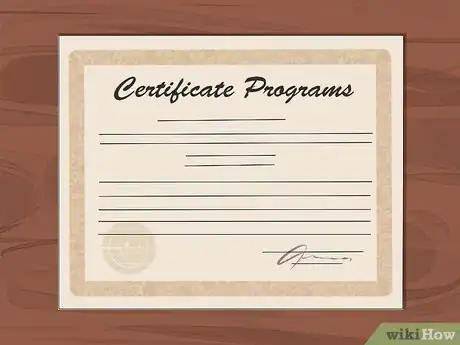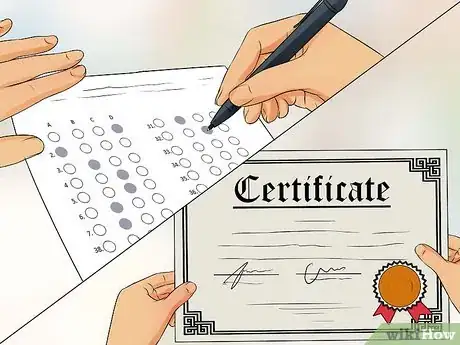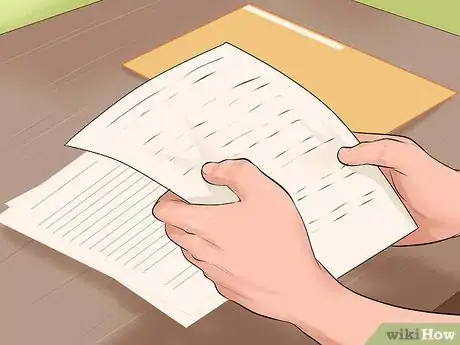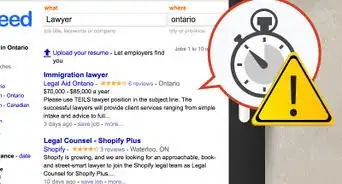This article was co-authored by Clinton M. Sandvick, JD, PhD. Clinton M. Sandvick worked as a civil litigator in California for over 7 years. He received his JD from the University of Wisconsin-Madison in 1998 and his PhD in American History from the University of Oregon in 2013.
There are 11 references cited in this article, which can be found at the bottom of the page.
This article has been viewed 36,613 times.
Would you like to work in the legal field, but don't want to be an attorney? Consider becoming a paralegal or legal assistant. You'll assist lawyers in legal research and case filing. Most paralegals are employed at law firms where they perform a variety of functions ranging from writing and compiling files to corresponding with clients. In the area of intellectual property, paralegals conduct research on patents, copyrights, and trademarks. They also keep up with legal developments regarding protected technology, products, and ideas. Once you've become a paralegal, you can specialize in the area of intellectual property.
Steps
Becoming a Paralegal
-
1Get your associate's degree. This is usually the minimum education requirement for becoming a paralegal, according to the U.S. Bureau of Labor.[1] Associate's degrees are generally two-year programs and you should get your degree with an emphasis on paralegal studies. 25% of American paralegals have associate's degrees. Understand that as the field becomes more competitive, having a more advanced degree will give you more career and advancement opportunities.
- While the National Federation of Paralegal Associations (NFPA) recognizes an associate degree, it strongly recommends getting a bachelor's degree in paralegal studies.
-
2Graduate with your bachelor's degree. Getting a bachelor's degree and completing a formal paralegal program will allow you to compete for paralegal jobs upon graduation. It's estimated that 49% of paralegals in the U.S. have bachelor's degrees. You can major in paralegal or legal studies, depending on your school's program offerings.
- Try to get at least 24 semester hours of legal studies that will help you in your job as a paralegal.
Advertisement -
3Take a certification program. Paralegal certification programs are useful options if you've already completed a four-year degree in an unrelated field, or if you have experience in a paralegal setting, but don't have a degree or certificate.[2] [3] Many certification programs are available, but look for one that's been approved by the American Bar Association (ABA). This could give you an advantage when job searching.[4] National certification programs are available, including the following:
- The Paralegal Core Competencies Exam (PCCE) is offered by the NFPA.
- The Certified Paralegal/Certified Legal Assistant (CP/CLA) exam is offered by the National Association of Legal Assistants (NALA).
- The Professional Paralegal (PP) exam is offered by the Association for Legal Professionals (NALS).
-
4Gain professional experience. Once you've become a certified paralegal, consider getting actual office experience. Look for internships or part-time jobs that will get you hands-on experience, which many law firms will look for before hiring you as a full-time intellectual property paralegal.
- Work on your management skills. Try to get leadership opportunities in your current job, or internship, or take a management class. This will show future employers that you're able to handle leading and working with a team.[5]
Specializing In Intellectual Property
-
1Learn about the expectations for an intellectual property paralegal. You'll need to be skilled in the general expectations for a paralegal (good communication, management skills, and computer skills).[6] Intellectual property paralegals will also need good research skills. You'll need to be familiar with copyright law, trademark law, and patent law in addition to intellectual property law. You may want to learn how to specifically handle the following:
- Trademarks, which are protected words, names, symbols, or designs.[7] As a paralegal, you may be asked to search the trademark database to see if a trademark already exists on something. To conduct this type of search, go to this government website and follow the directions.
- Trade secrets, which is information protected by the government and can include things like formulas, patterns, compilations, programs, devices, methods, techniques, or processes. Trade secrets are protected without registration, and, therefore, there is no real way to search a database of them.[8] Most trade secret issues come up in litigation, so a paralegal would most likely be conducting much more conventional legal research here (i.e., searching statutes and cases).
- Copyrights, which grants the holder of the copyright the exclusive right to reproduce, distribute, perform, display, and license the work that is copyrighted.[9] Paralegals are likely to be asked to search copyright records, which can be done on this government website.
- Patents, which grants the holder of the patent the exclusive right to make, use, import, and sell the patented object for a limited period of time.[10] As a paralegal, you may be asked to search for patents in order to see if someone has already patented a client's idea. To search for patents, follow the directions on this government website, which includes all of the information you will need.
-
2Earn a specialized or advanced certificate. Several programs offer advanced coursework for paralegals, allowing you to specialize in an area. Look for an intellectual property law program. Depending on the program, you'll need to take several hours of coursework and pass an exam. Note that this advanced coursework is available for people that are already trained paralegals.
- Specialization may allow you to get a pay increase if you're already employed at a law firm. Intellectual property specialization is one of the more profitable specializations available.[11]
-
3Search current job openings. It may be helpful to contract the services of a paralegal job placement agency, although they may charge a fee. They may be able to identify a suitable law firm for you if you lack legal work experience. You should also learn to network. If you're already volunteering or working part-time at a law office, use your connections to ask about job openings. Look into any local intellectual property paralegal associations and join in order to meet people.[12]
- If you're volunteering in a law office, don't forget that you can ask for letters of reference from the attorney you work for.
-
4Conduct informational interviews. An informational interview is an informal conversation with someone working in the field you want to find a job in.[13] The goal of an informational interview is to gain information and advice, not necessarily to find a job.[14] However, informational interviews can lead to jobs, so take this process seriously. In order to conduct informational interviews, follow these steps and take a look at this great wikiHow article:
- Identify people to interview;
- Prepare for the interview;
- Initiate contact;
- Conduct the informational interview; and
- Follow-up with the person you interviewed with.[15]
-
5Apply to law firms. Depending on current job openings, you may need to apply for a legal assistant position. Be sure to include a professional resume that highlights your education, certification, and any experience. Write a cover letter that emphasizes your ability to conduct high-quality and thorough research.
- Remember to specifically state why you're interested in intellectual property law and working in that particular office.
-
6Interview with law firms. Most paralegals that specialize in an area (such as intellectual property law) say they generally spend about 40% of their time within that field.[16] Because of this, you'll want to appear well-rounded and able to complete a variety of paralegal tasks. Talk about your writing skills, ability to work on projects, and demonstrate your familiarity with intellectual property law.
- If you have experience in a law office or legal setting, highlight this experience. Convince your interviewer that you understand how a law firm works and how you, as a paralegal, would fit in.
References
- ↑ http://study.com/articles/Become_an_Intellectual_Property_Paralegal_Career_Roadmap.html
- ↑ http://www.bls.gov/ooh/Legal/Paralegals-and-legal-assistants.htm#tab-4
- ↑ http://study.com/articles/Become_an_Intellectual_Property_Paralegal_Career_Roadmap.html
- ↑ http://study.com/articles/Become_an_Intellectual_Property_Paralegal_Career_Roadmap.html
- ↑ http://www.paralegalalliance.com/what-is-an-intellectual-property-ip-paralegal/#axzz3lAtEmeVD
- ↑ http://www.bls.gov/ooh/Legal/Paralegals-and-legal-assistants.htm#tab-4
- ↑ https://www.law.cornell.edu/wex/Trademark
- ↑ https://www.wipo.int/tradesecrets/en/tradesecrets_faqs.html
- ↑ https://www.law.cornell.edu/wex/copyright
- ↑ https://www.law.cornell.edu/wex/Patent
- ↑ http://www.paralegaledu.org/types-of-paralegals/
- ↑ http://www.paralegalalliance.com/what-is-an-intellectual-property-ip-paralegal/#axzz3h9H6te3E
- ↑ https://career.berkeley.edu/Info/InfoInterview
- ↑ https://career.berkeley.edu/Info/InfoInterview
- ↑ https://career.berkeley.edu/Info/InfoInterview
- ↑ http://www.paralegaledu.org/types-of-paralegals/
- ↑ http://www.bls.gov/ooh/legal/paralegals-and-legal-assistants.htm#tab-4





































































